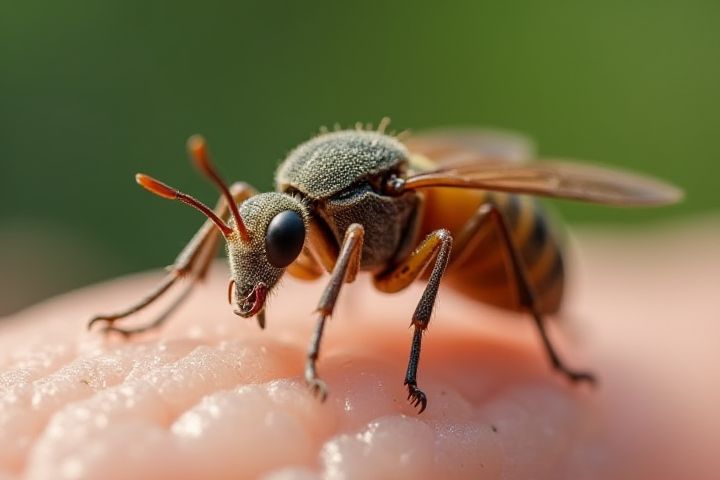
Identifying the type of pest in your home is crucial for effective management; common pests include ants, rodents, and termites, each requiring specific strategies. Implement preventive measures such as sealing entry points, maintaining cleanliness, and reducing moisture to deter infestations. Using traps, baits, and natural repellents can help eliminate existing pests without the need for harsh chemicals. If the infestation persists or is severe, consider contacting a professional pest control service that specializes in eco-friendly solutions. Regular inspections and maintenance can keep your home pest-free and protect your health and property.
How To Handle House Pest Problems
Identify the pest accurately
Identifying the pest accurately is the cornerstone of effective pest control in your home. Begin by observing the pest's physical characteristics, such as size, color, and shape, which can help narrow down the potential species. Take note of their behavior, including movement patterns and feeding habits, as this information can provide valuable insights into their nature and habitat. Use reliable resources, such as pest identification guides or online databases, to compare your observations and confirm the species, ensuring you implement the most effective treatment strategy.
Keep a clean environment
To effectively tackle house pest problems, maintaining a clean environment is crucial. Regularly vacuuming carpets and rugs can reduce food particles and debris that attract pests, while promptly wiping down surfaces with disinfectant prevents the buildup of grime. Dispose of trash daily in sealed containers to eliminate potential nesting grounds for rodents and insects. You should also declutter spaces, as organized areas are less appealing to pests and easier to monitor for any signs of infestation.
Seal entry points
To effectively handle house pest problems, begin by sealing entry points, as this can significantly reduce pest infestations. Inspect your home's exterior for cracks, gaps, or openings, particularly around windows, doors, and foundations; a mere 1/4 inch gap can allow pests to enter. Use materials such as caulk, steel wool, or mesh screens to block these areas, ensuring your home remains pest-free. Consistently monitoring and maintaining these seals can safeguard your living space from unwanted invaders year-round.
Use natural repellents
Natural repellents can effectively manage house pest problems while minimizing harmful chemicals. Common options include essential oils such as peppermint, lavender, and tea tree oil, which deter insects like ants and spiders. Diatomaceous earth, a fine powder made from fossilized algae, can be sprinkled in areas where pests are active, dehydrating and killing them upon contact. By incorporating these natural solutions into your pest control strategy, you can create a safer and healthier living environment for you and your family.
Set traps strategically
Set traps strategically in areas where you notice pest activity, such as near entry points, along walls, and in dark corners. For maximum effectiveness, position traps at least 2 to 3 feet apart to capture a larger number of pests while avoiding overcrowding. Use bait that appeals to specific pests, ensuring that it aligns with their feeding habits; for instance, peanut butter works well for rodents, while sticky traps may help with insects. Regularly check and replace traps to maintain effectiveness, as this proactive approach can reduce infestations by up to 80% over time.
Opt for bait stations
Opting for bait stations is an effective strategy for managing house pest problems, particularly for rodents and insects. These stations contain attractants laced with insecticides or rodenticides, designed to lure pests while minimizing exposure to humans and pets. In residential settings, place the bait stations in high-traffic areas such as basements, kitchens, and entry points, ideally near droppings or nests. Regularly monitor these stations to gauge pest activity, replenishing bait as necessary to ensure optimal effectiveness in controlling infestations.
Consult pest control professionals
Consulting pest control professionals is essential for effectively addressing house pest problems. These experts utilize advanced techniques and products, ensuring a thorough assessment of your specific pest issue. Many pest control companies offer integrated pest management (IPM) strategies, which not only eliminate pests but also prevent future infestations by focusing on environmental and behavioral factors. With over 85% of pest control interventions yielding long-term results, you can have peace of mind knowing your home is safeguarded against unwanted invaders.
Regularly inspect high-risk areas
Regularly inspecting high-risk areas around your home, such as basements, attics, and kitchens, is crucial for effective pest control. Look for signs of pest activity, including droppings, gnaw marks, and nests, which can indicate an infestation. Implement preventive measures by sealing cracks and gaps, ensuring that windows and doors are fitted with screens, and maintaining proper sanitation to eliminate food sources. Conducting these inspections at least once a month can help you identify and address pest issues early, reducing the need for extensive treatments later.
Dispose of waste properly
To effectively manage house pest problems, one critical strategy is to dispose of waste properly, as improper waste management attracts pests like rodents and insects. Segregate biodegradable waste, such as food scraps, in sealed containers and dispose of it regularly to minimize odors and food sources for pests. Your trash bins should have tight-fitting lids and be emptied at least once a week, while any recyclable materials should be rinsed to eliminate lingering odors. Implementing these waste disposal practices can significantly reduce the likelihood of pest infestations in your home.
Maintain humidity control
Maintaining humidity control is essential for preventing pest infestations in your home. Ideally, indoor humidity levels should remain between 30% and 50%, which you can achieve using dehumidifiers or air conditioning systems. Regularly check your home's moisture levels with a hygrometer, particularly in basements, bathrooms, and kitchens, where dampness often accumulates. Reducing excess humidity not only helps to deter pests like mold and cockroaches but also contributes to a healthier living environment for you and your family.
